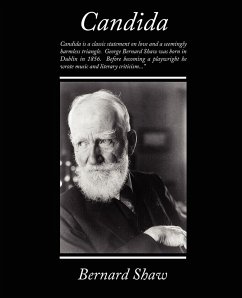
Candida
Versandkostenfrei!
Versandfertig in 1-2 Wochen
18,99 €
inkl. MwSt.
Weitere Ausgaben:

PAYBACK Punkte
0 °P sammeln!
"Candida" is a play written by the famend Irish playwright and critic, George Bernard Shaw. The play is a witty exploration of affection, marriage, and societal expectations. The important person, Candida, is a robust and independent lady who turns into the focus of a love triangle involving her husband, the Reverend James Morell, and a young poet named Eugene Marchbanks. Set against the backdrop of Victorian society, the play demanding situations traditional notions of marriage and examines the dynamics of relationships. Morell, a charismatic socialist preacher, is dedicated to his work and h...
"Candida" is a play written by the famend Irish playwright and critic, George Bernard Shaw. The play is a witty exploration of affection, marriage, and societal expectations. The important person, Candida, is a robust and independent lady who turns into the focus of a love triangle involving her husband, the Reverend James Morell, and a young poet named Eugene Marchbanks. Set against the backdrop of Victorian society, the play demanding situations traditional notions of marriage and examines the dynamics of relationships. Morell, a charismatic socialist preacher, is dedicated to his work and his ideals, but the arrival of Marchbanks complicates subjects. Marchbanks, infatuated with Candida, brings forth questions on love and passion that pressure the characters to confront their own desires and vulnerabilities. Shaw's "Candida" is thought for its sharp wit, smart speak, and incisive social observation. Through the interactions of the characters, the play delves into the complexities of human feelings and the societal expectancies that shape relationships. Candida's person emerges as a symbol of woman organization, difficult traditional gender roles.














